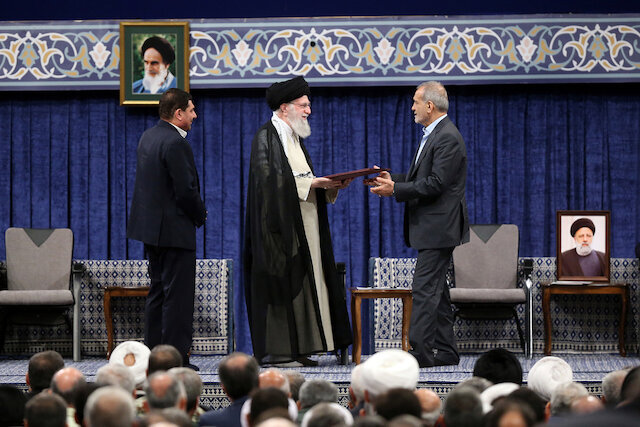Hope and resilience shine at Pezeshkian's confirmation

TEHRAN – The sizzling hours of Sunday morning marked the beginning of a new and colossal mission for a former health minister and five-time parliament member in Iran.
By 10 am Tehran time, hundreds had gathered at Imam Khomeini Hussainiyah, a multi-purpose venue at the heart of Tehran hosting both religious ceremonies and important addresses by the Leader of the Islamic Revolution Ayatollah Seyyed Ali Khamenei.
A limited number of journalists were allowed to witness the event alongside the distinguished gathering which, apart from representatives and ambassadors from several nations, included prominent Iranian figures like high-ranking IRGC and army commanders, current and former ministers, former presidents, top judiciary officials, and prominent clerics.
The room buzzed with conversation as guests settled in, some on chairs, others on the floor, perhaps reflecting a sense of relief that the country had overcome the potential challenges it could have faced following the sudden and tragic President Ebrahim Raisi. Conversations among the guests revealed a mix of emotions, a sense of loss for Raisi alongside a sense of accomplishment in managing to move the country forward in circumstances that might have spelled disaster for many nations around the world.
Where women were seated, I got to speak with an elderly lady who said her son had been martyred while he was serving as an advisor in Syria during the fight against Daesh terrorists in the 2010s. She told me that the current situation brought back memories of the difficult months after she lost her son.
“When I received the news of my son's death, I couldn't help but wonder if anyone would step in to take his place. At that time, Daesh had instilled extreme fear across the entire region. They had just filmed the horrific act of burning a man alive in a cage and continued to release videos of their beheadings of captives. I thought to myself that given the terrifying circumstances, it was unlikely many would be willing to fill my son's role in Syria. To my astonishment, however, an increasing number of people volunteered to go to Syria and fight against the terrorists. And we eventually managed to defeat the Takfiris,” she said as her eyes welled up with tears.
“President Raisi was a dedicated official who tirelessly worked to guide the country through some of its greatest challenges. While his loss is deeply sorrowful, the ceremony we are attending today serves as a reminder that there are always individuals in this nation willing to carry on the work left by those who came before them. Leading the country in the current international and regional landscape is a formidable task, but there are individuals like Mr. Pezeshkian who are prepared to give their all so this country would be able to keep course.”
The inauguration ceremony began a few minutes after our conversation ended. Ayatollah Khamenei entered the venue from behind closed curtains as the crowd stood up in Takbir. Upon the Leader's arrival, he was flanked on his left by President-elect Masoud Pezeshkian, Parliament Speaker Mohammad Baqer Qalibaf, and Judiciary Chief Gholamhossein Mohseni Eje'i. To his right were other prominent figures including Acting President Mohammad Mokhber, Head of the Expediency Discernment Council Sadegh Amoli Larijani, Head of the Assembly of Experts Mohammad Ali Mohammadi Kermani, and finally Secretary of the Guardian Council Ayatollah Ahmad Jannati.
Following separate speeches by Interior Minister Ahmad Vahidi and Pezeshkian, it was the Leader’s turn to speak to the audience and the nation. Ayatollah Khamenei addressed key events both in Iran and globally. He discussed the current geopolitical landscape, particularly focusing on the Palestinian cause, and offered an overview of Iran’s modern history, explaining how Iran came to commemorate the inauguration of its 9th President. He then provided several pieces of advice on how Pezeshkian’s administration should view and deal with domestic and international challenges.
Despite touching on a wide range of subjects, Ayatollah Khamenei remained his characteristically composed and calm self throughout his remarks. It seemed to me, however, that one emotion resonated above all others in his words: a deep-seated confidence. It was as if he believed, with absolute certainty, that this nation would weather any storm and continue on its path toward progress.
"He looks at ease, doesn't he?" The woman, who had earlier shared the story of her son with me, leaned closer, her eyes locked on the Leader's face. "I think we are on the same page about where this country is headed,” she murmured.
By Mona Hojat Ansari
